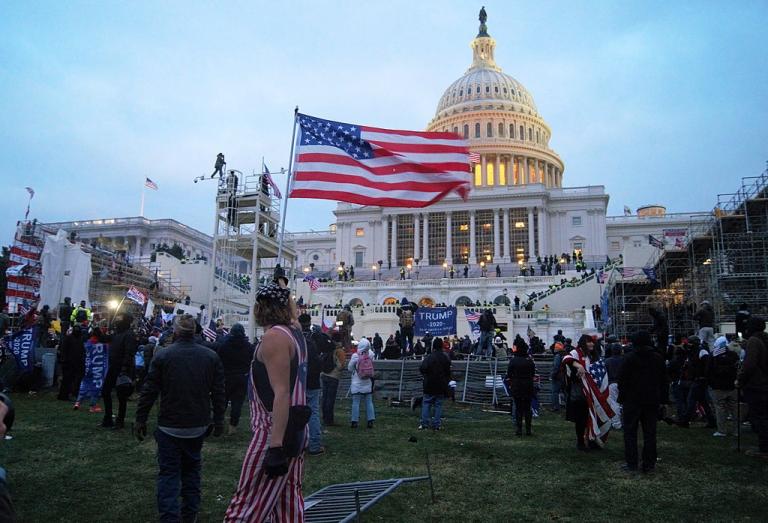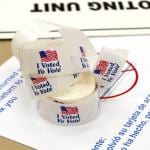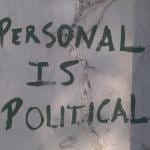Trump supporters used to be portrayed as nationalists, as extreme patriots whose desire to “make America great again” was too laudatory of the U.S.A. Now they are being portrayed as insurrectionists and terrorists who are trying to destroy America.
The January 6 attack on the Capitol by some five hundred Trump supporters has given rise to a new narrative about conservatives in general.
Jonathan S. Tobin discusses this new rhetorical framing:
The rhetorical inflation of a dangerous riot by a mob to a full-blown “insurrection” is more than political hyperbole.
By retroactively transforming the riot at the Capitol into an armed rebellion conducted by white supremacists and then linking it to not just Trump but to everyone who attended his Jan. 6 rally, supported his questioning of the 2020 election results or even those who voted for him, the goal to the exercise is more far-reaching than most GOP officeholders still seem to understand.
What Trump’s opponents have done is to launch a campaign that seeks to treat the “insurrection” as not just the fitting culmination of the Trump administration but the prism through which to view the Republican Party as disloyal, authoritarian, and violent.
As an example of this “rhetorical inflation,” consider Casey Michel’s article in Politico What Ulysses Grant Can Teach Joe Biden About Putting Down Violent Insurrections. He compares the January 6 rioters to the “white terrorists” who arose in the South after the Civil War, particularly the Ku Klux Klan, an “insurrection” that President Grant crushed with federal troops. And while admitting that the scale of the uprisings is not really equivalent, Michel nevertheless recommends Grant’s tactics:
Grant’s approach relied on a combination of brute military force and a drastic curtailment of civil liberties, yet it nevertheless has relevance for the current moment and contains lessons for lawmakers who fear that January 6 might have been only the first of widespread attacks on the government and elected officials at all levels, across large swaths of the nation. Officials in our current era have many more legal tools at their disposal to combat such terrorism. But as Grant’s experience shows, it’s not just the tools that count; rather, it’s the willingness to persist in the fight that will likely decide whether these counter-terrorism efforts actually succeed.
Then there are the claims that religious Trump supporters are the equivalent of Islamic terrorists. Robert
J. D. Tuccille, in his article for Reason Magazine entitled Americans Shouldn’t Be Treated Like ISIS Insurgents, quotes intelligence operatives in Iraq and Afghanistan who are drawing those parallels and urging the use of similar counterinsurgency measures:
“The challenge facing us now is one of counterinsurgency,” Robert Grenier, former CIA station chief for Pakistan and Afghanistan and later director of the CIA Counterterrorism Center, insists in The New York Times. “Though one may recoil at the thought, it provides the most useful template for action.”
The danger, Grenier adds, lies in “a large, religiously conservative segment of the population, disproportionately (though not entirely) rural and culturally marginalized.” He doesn’t believe that the entire segment is violent, but it constitutes “a mass of citizens—sullen, angry and nursing their grudges—among whom the truly violent minority will be able to live undetectably, attracting new adherents to their cause.” . . .
Days earlier, former CIA director John Brennan had similarly claimed that the Biden administration is focusing on “what looks very similar to insurgency movements that we’ve seen overseas,” consisting of “an unholy alliance” of “religious extremists, authoritarians, fascists, bigots, racists, Nativists, even libertarians.”
“Even libertarians!”
Meanwhile, New York Times technology columnist Kevin Roose has a solution for dealing with America’s “misinformation crisis” that has given rise to all of these extremists: “Several experts I spoke with recommended that the Biden administration put together a cross-agency task force to tackle disinformation and domestic extremism, which would be led by something like a ‘reality czar.’”
The Spectator columnist with the nom de plume Cockburn summarizes what Roose has in mind in “All Hail the ‘Reality Czar’!“:
Roose proposes that his reality autocrat be empowered to ‘push for structural changes’ that will ‘help’ tech companies fix ‘misinformation problems.’ Roose also suggests giving tech companies special legal exemptions from privacy law so they can share information about conspiracy theorists without violating pesky privacy laws. And if tech companies aren’t interested, that’s no biggie. Roose points out that many companies are worried about antitrust investigations from Democrats, so they might be amenable to a ‘nudge’ in the direction of transparency.
Cockburn comments on the “Reality Czar” designation, “Just call it ‘minister of propaganda.’ Everybody will already know that’s what it means.”
Certainly the January 6 riot was a disgrace, and there are some bad people on the far right. Any one who marched shoulder to shoulder with fellow protesters wearing Nazi regalia–representing an ideology that Americans in our Greatest Generation fought to the point of sacrificing their lives–forfeits any claim to be patriotic or Christian or conservative. But to hear most of the protesters telling it, they were not attempting an insurrection; rather, they were under the impression that they were opposing an insurrection on the part of anti-democratic forces who had stolen the election.
We should support the police and other law enforcement agencies in bringing rioters and terrorists foreign and domestic–no matter where they fit on the ideological spectrum–to justice. But the number of Trump supporters, conservatives, and Republicans prone to violence is vanishingly low. As is the number that believe in weird conspiracy theories. (See John Daniel Davidson’s The QAnon Takeover Of The GOP Is A Fantasy Of Corporate Media And Democrats.)
Historically, small-scale uprisings have often been used as pretexts for wide-ranging crackdowns against civil liberties. That would be a greater threat to our democracy than these current alleged “insurrections.”
Photo: “United States Capitol: Outside Protesters with U.S. Flag,” by Tyler Merbler from USA, CC BY 2.0 <https://creativecommons.org/licenses/by/2.0>, via Wikimedia Commons














